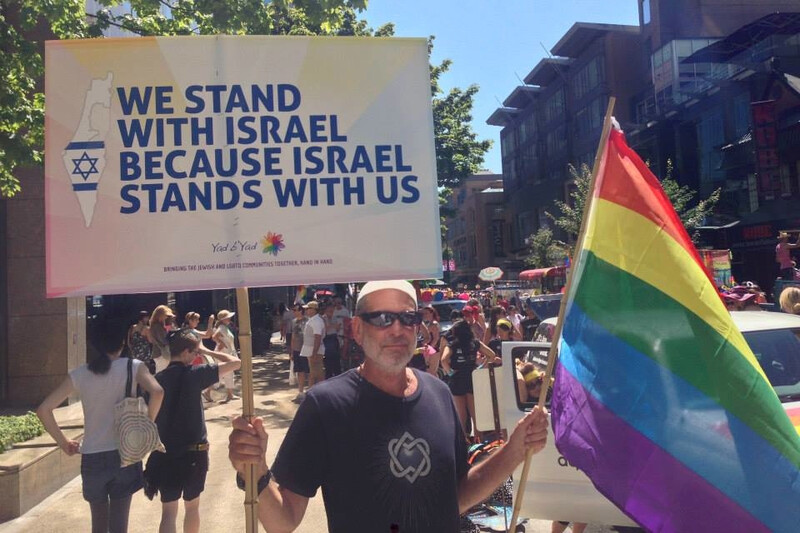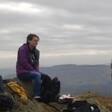Arts and Culture 27 July 2015

An image from 2014 Vancouver Pride, posted on Facebook by the pinkwashing group Yad b’Yad LGBTQ.
The organizers of the 2014 Vancouver Queer Film Festival attracted anger and disappointment when the event’s program included advertising from pro-Israel pinkwashing group Yad b’Yad LGBTQ.
Despite policy changes, the festival’s stance on Palestine this year ensures that controversy is not going away.
In a particularly blatant piece of propagandizing, the 2014 advertisement even featured the Israeli flag superimposed over the LGBTQ movement’s rainbow banner.
The advertisement came after years of unwillingness by the festival to confront the issue of pinkwashing, despite protests by groups such as Queers Against Israeli Apartheid. QuAIA’s statement on the advertisement expressed outrage at “the appropriation of queer and trans struggles for liberation in order to obscure, excuse, and justify Israeli state violence.”
Pinkwashing is a public relations strategy that deploys Israel’s supposed enlightenment toward LGBTQ issues to deflect criticism from Israel’s human rights abuses and war crimes and as a means to build up support for Israel among Western liberals and progressives.
Previous incidents at the festival included the screening of several Israeli films with the sponsorship of the Israeli consulate and the hosting in 2013 of a panel – featuring no Palestinian speakers – on boycott, divestment and sanctions (BDS).
Guidelines published by the PACBI — the Palestinian cultural and academic boycott campaign — call for a boycott of Israeli state funding for cultural events.
In 2012, an Israeli director called the occupied West Bank and Gaza Strip “primitive” during a question and answer session at the festival.
The festival’s position was condemned not only by campaigners in Canada, but by queer cultural activists internationally. The Outside the Frame film festival, for instance, barred entrants to the Vancouver festival from submitting their work.
Avoidance
Now, with just two weeks to go before the 2015 festival opens, organizers are still failing to take a stand on the Israeli occupation in Palestine and other abuses of Palestinian rights.
In spring 2015, festival organizing body Out On Screen went through a process of discussion and internal negotiation designed to stake out a new position.
The outcomes were a new advertising policy which refuses all use of “nationalist” imagery, including national flags, and a statement titled “An Open Letter to Our Community” which sets out the festival’s stance on BDS, Israeli film and Palestinian rights.
The new position also includes a ban on non-Canadian government funding, except for travel costs to bring international filmmakers to the festival.
But the VQFF statement is – unsurprisingly, considering Out On Screen’s former attitudes – fundamentally weak. Whilst on one hand apparently recognizing the “asymmetrical” nature of the situation in Palestine, Out On Screen also claims to “recognize that the Israeli occupation is understood differently by many people.”
The overall effect is one of failure to grapple with the issue at hand and of seeking a “balance” that ends up treating occupier and occupied as if they are equal morally and in terms of power.
Community rejection
Unsurprisingly, many are unhappy with the new stance.
The Catherine White Holman Wellness Center (CWHWC), an organization which provides “low-barrier wellness services to transgender and gender non-conforming people,” has declared that it will not partner with the Vancouver Queer Film Festival.
According to a statement from the center, the festival organizers’ new policy:
does not satisfactorily address the concerns about pinkwashing that the community has been raising for many years. The VQFF decision to not accept nationalist-based advertising appears to be a way to try to address the community’s concerns without having to take a particular stance on the Israel-Palestine conflict. What is being asked, however, by us and by many others, is exactly that: to take a stand.
The Catherine White Holman Wellness Center’s letter also insists that “In our Collective Ethics, all of the volunteers who are connected to the CWHWC have agreed to the following: We are committed to anti-oppression.” According to the organization, that includes Israeli oppression of Palestinians as well as the oppression faced by LGBTQ people in Western societies.
And a Palestinian queer activist from the Vancouver area was also moved on Nakba Day to take the festival to task for its weak reaction to accusations of pinkwashing.
In an open letter which also acknowledges the wrongs done to the indigenous peoples on whose land Vancouver was built, the activist writes: “I am enraged, and because I feel it is time that a Palestinian queer voice was finally heard.”
And in direct response to the closing lines of the Out On Screen statement, which claims that “we hope you join us. There’s room for us all,” the blogger writes:
The festival’s approach of evaluating BDS is paternalistic and colonial. Their approach suggests that somehow a handful of mostly non-Palestinian and white settlers have the authority to determine the terms of Palestinian resistance. It is absurd that a non-Palestinian and mostly white organization has felt entitled to evaluate the legitimacy of a widely supported method of Palestinian anti-colonial struggle only to find that BDS is not in line with their “anti-oppressive framework.” If there is no room for BDS in their “anti-oppressive framework,” there is no room for me at the festival.





